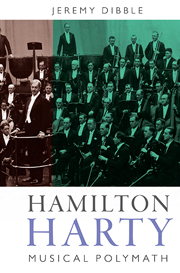Book contents
- Frontmatter
- Dedication
- Contents
- List of Illustrations
- List of Music Examples
- Preface
- Abbreviations
- Epigraph
- 1 1879–1901 Hillsborough, Belfast and Dublin: A Musical Apprenticeship
- 2 1901–9 London (1): A Pre-eminent ‘Collaborator’ and Aspiring Composer
- 3 1909–14 London (2): Composer and Conductor
- 4 1914–20 The War Years and After
- 5 1920–27 The Hallé Years
- 6 1927–33 Apogee: From Hallé to the LSO
- 7 1933–6 America and Australia: An Unforeseen Romance
- 8 1936–41 The Last Years: The Children of Lir – A Creative Codicil
- APPENDIX 1 List of Works
- APPENDIX 2 List of Recordings
- Bibliography
- Index of Harty's Works
- General Index
- Music in Britain, 1600–2000
8 - 1936–41 The Last Years: The Children of Lir – A Creative Codicil
Published online by Cambridge University Press: 05 December 2013
- Frontmatter
- Dedication
- Contents
- List of Illustrations
- List of Music Examples
- Preface
- Abbreviations
- Epigraph
- 1 1879–1901 Hillsborough, Belfast and Dublin: A Musical Apprenticeship
- 2 1901–9 London (1): A Pre-eminent ‘Collaborator’ and Aspiring Composer
- 3 1909–14 London (2): Composer and Conductor
- 4 1914–20 The War Years and After
- 5 1920–27 The Hallé Years
- 6 1927–33 Apogee: From Hallé to the LSO
- 7 1933–6 America and Australia: An Unforeseen Romance
- 8 1936–41 The Last Years: The Children of Lir – A Creative Codicil
- APPENDIX 1 List of Works
- APPENDIX 2 List of Recordings
- Bibliography
- Index of Harty's Works
- General Index
- Music in Britain, 1600–2000
Summary
Harty often holidayed in Ireland during the months of May and June and 1936 was no exception. Although he usually frequented Donaghadee, Rostrevor or Carlingford Lough close to the Mourne mountains, on this occasion he spent the summer at Portballintrae, a delightful seaside village east of Portrush and west of the ‘Giant's Causeway, rich in views and a bracing seascape. In England, perhaps in his favourite spot at Lambrigg, he had planned a period of quietness to fulfil a request from Universal (who had done well from his Handel transcriptions) to orchestrate some of Chopin's piano music; there was also the need to recharge his batteries in preparation for a European tour in the autumn to Poland and Yugoslavia. But his friends were clearly concerned for his health and urged him to use his time in Ireland to recuperate as fully as possible. In his Portballintrae hotel Harty hired a piano and befriended some of the locals, including James Moore, a young organist in the town of Bushmills close by, who was delighted to establish the acquaintance of such an eminent musician and fellow Ulsterman. Harty, Moore, and the conductor DeLamarter from Chicago, who came to Portballintrae for a week, travelled around the locality in Moore's decrepit car. An additional visit came from a childhood companion, Sir William Thomson, who was now Professor of Medicine at Queen's University. Thomson grew up close to Harty in neighbouring Annahilt in Co. Down where his father was a dispensing doctor.
- Type
- Chapter
- Information
- Hamilton HartyMusical Polymath, pp. 260 - 298Publisher: Boydell & BrewerPrint publication year: 2013



